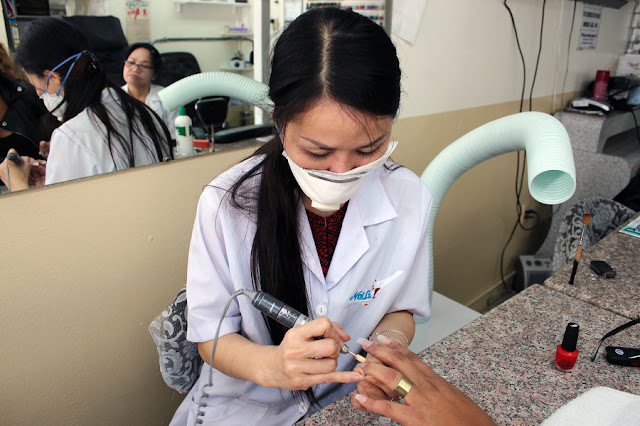The wage and hour division helps all workers in the United States, regardless of immigration status.
As a nail salon worker you have the right to be paid full and fair wages for all hours you work. Know your rights!
Hours Worked:
- You must be paid for all work performed whether or not the employer approves the work in advance.
- This includes time spent in training, traveling from site to site during the day, and any work performed "off the clock".
Minimum Wage and Deductions:
- You must be paid at least the federal minimum wage of $7.25 per hour.
- Even if you are paid by the day or at a piece rate, your total wages must amount to at least the federal minimum wage for each hour worked.
- Your employer may deductions for job-related expenses such as uniforms, equipment rentals, or tools but such deductions cannot reduce your pay below the federal minimum hourly wage.
- Some state laws require higher minimum wages and greater employee protection; employers must comply with those laws as well as the federal rules described here.
Overtime Pay:
- Generally, you must be paid 1- 1/2 times your regular rate of pay after 40 hours of work in a seven-day workweek.
Record-keeping:
- Employers are required to keep accurate records of all their employee's daily and weekly hours worked and wages paid.
- You should keep your own records of your work hours and wages, and phone number.
Stay health and safe while giving manicures and pedicures
Products used in nail salons can contain harmful chemicals. Over time, repeated use or exposure to high concentrations of these chemicals could damage your body or cause serious health effect. You have the right to working conditions that do not put you at risk of serious harm.
Hazardous Chemicals in Nail Salon Products
- Acetone (nail polish remover): headaches, dizziness, irritated eyes, skin and throat.
- Dibutyl phthalate (DBP) (nail polish): nausea, irritated eyes, skin, nose, mouth and throat.
- Ethyl methacrylate (EMA) (artificial nail liquid): asthma, irritated eyes, skin, nose and mouth; difficulty concentrating. Exposures while pregnant may affect your child. (Methyl methacrylate is banned in many states.)
- Formaldehyde (nail polish, nail hardener): can cause cancer; difficulty breathing; asthma like attacks; allergic reactions; irritated eyes, skin and throat.
- Toluene (nail polish, fingernail glue): dry or cracked skin; headaches, dizziness, and numbness; irritated eyes, nose, throat and lungs; damage to liver and kidneys; and harm to unborn children during pregnancy.
Getting information about Chemicals in Salon Products
- Professional nail salon products that contain hazardous chemicals must provide warning and precautionary statements;
- Salons must provide you with safety data sheets (SDSs) for the products that contain hazardous chemicals. SDSs list hazardous ingredients, how you can be exposed, health and safety risks, and steps for safe use and storage. You have the right to ask for and receive a copy of the SDS.
Protecting Worker Health
- Whenever possible, use less hazardous products. Some products claim to be made with out the toxic trio (toluene, formaldehyde, and dibutyl phlalate).
- Ventilate salons and let in fresh air. Open doors and windows, always keep exhaust, heating and air conditions system, and ventilation tables on; and use portable ventilation machines.
- Keep products off skin and out of eyes. Wear gloves and goggles when transferring product; wear long sleeve shirts; wash hands frequently and keep food away from chemicals.
- Safely store chemicals.








No comments:
Post a Comment